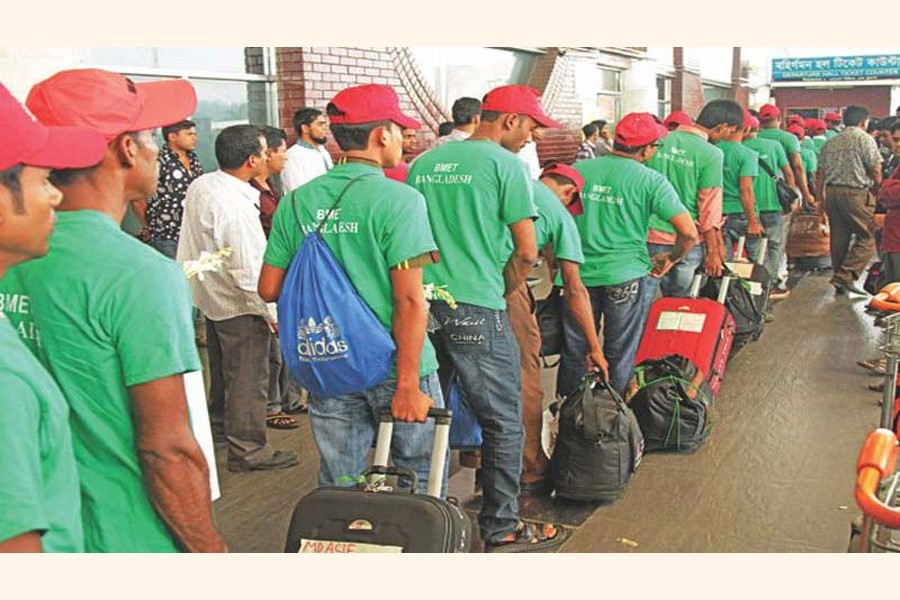In the wake of rising inflation and the recent decline in foreign currency reserve, Bangladesh immensely seeks solutions to control inflation and balance of payment through fostering the flow of wage earners remittances. Therefore, the role of migrant workers has become pivotal to manage the economic crisis as well as the wellbeing of their families. It is assumed that more than 7.3 million Bangladeshi workers have the capability to enrich foreign currency reserve up to 30 billion in a year. However, some limitations in terms of access to digital fund or money transfer, migration status, level of competencies and skills, availing welfare services and access to information from existing sources somehow interrupt the initiatives of government to increase foreign currency reserve as well as protecting migrant workers' wellbeing.
Digitalisation of service delivery system at pre- and post-migration stage has become essential to protect the migrants' rights and wellbeing. A strong digital labour migration management platform could reduce the migration cost and time for recruitment, which often push migrant workers to choose irregular paths. Though migrant support services including welfare services, legal assistance and online training services are being delivered through digital means in different countries, Bangladesh is yet to make any headway in this direction. Moreover, digitalisation in overseas recruitment process is a viable means to protect the migrants from any fraudulence as it stores important documents-- such as job contract, payment slips, training certificates, medical certificates, visa documents etc., and could be useful for dispute resolution.
LABOUR MIGRATION MANAGEMENT SYSTEM: Access to Information is an innovative initiative of Bangladesh to foster digitalisation with the objective to connect Bangladesh with the rest of the world and create a communication, trade and technological regional hub. Despite different government digital service portals, the expatriate ministry with the technical support of different INGOs and development agencies took initiatives to digitalise migration governance. To foster the digitalisation process, Bangladesh government has built partnership with private sectors, and taken a number of initiatives to minimise the hurdles of migrants to access information and services. Hence, in 2018 with the technical support from SDC, ILO and UNDP, the Ministry of Expatriate Welfare and Overseas Employment developed the Labour Migration Management System (http://www.migration.gov.bd/en) website which is yet to be ready for the public to provide updated information. Though the online site has been developed to minimise efforts to search individually BMET, WEWB, PKB or BKTTC services, appropriate web linkage and updated information is still missing.
WHERE ARE THE LIMITATIONS?: Although the appearance and structure of the website is good, missing in updated data, information and web links makes it poor to access and use. For example: pre-migration information is not much descriptive as well as updated. Similarly, the online training content and pre-departure training content has not been merged with Muktopaath (https:// muktopaath.gov.bd/) or BKTTC E-learning Platform (https://bkttcdhaka.gov.bd/). Some country-wise information is also missing and the existing information do not seem adequate. Moreover, contents or web links for DEMO registration, finger print, smart card online application, recruiting agencies, Probashi Kallayan Bank, Wage Earners Welfare Board and Expatriate Digital Centre (http://edc.gov.bd/) are also found missing. In sum, inappropriate contents or gaps in information may dissuade the migrants from accessing the digital platform and makes the government efforts ineffective to strengthen the labour migration management system.
WHAT TO IMPROVE AND INCLUDE?: Besides removing the limitations through providing updated data, and information related to labour migration and welfare, merging with other relevant web links the site could incorporate other components, websites or digital platforms like bdjobs (https://bdesh.bdjobs.com/ default.asp) for searching overseas jobs and vacancies, Bideshjaatra (https://bdeshjaatra.com) for migration preparation, Bibhui (http://iidbd.org/p9146/) for pre-departure orientation, Police Expatriate Help cell https://www.police.gov.bd/en/expatriate_help_cell) for lodging complaints, and Wage Earners Welfare Board migrants' registration (http://member.wewb.gov.bd/ wewbm/ createnewMemberHomeAll) for accessing welfare and reintegration services. According to some reports and studies performed by different activists, and NGOs, migrants and their families are not well familiarised with the support documents and forms for applying to avail different welfare services and aids. Therefore, it is important to link the available sites to access government forms including passport application, police clearance, legal aids, wage earners death compensation, medical aids, child scholarship, disability aids, loan from Probashi Kallayan Bank, and so on.
MORE THINGS TO DO: Union Digital Centres (UDC) is the hallmark achievement of the government's Digital Bangladesh vision, which are providing all public and private services to rural citizens. There are 4,500+ UDCs across the country covering most rural areas to ensure access to information and public and private services via online. These UDCs have the potential to become a hub for migrants to receive services as well as information as they serve 3.20 million people each month. Hence, enabling 9,100+ UDC entrepreneurs on providing migration related services as well as linkage with Expatriate Digital Cenre (http://edc.gov.bd/) is essential to ensure access to digital services from rural level.
Under the prevailing situation, it is challenging for migrants to access authentic information as well as protect their rights. Apart from this, digital education becomes mandatory at grassroots level to leverage the efficiency of government services, on which we need to focus. However, Bangladesh government has made significant advancement in digitisation of migration governance as well as simplifying support services, there are some gaps and inconsistencies.. Hence, we should welcome partnership based technical initiatives both from the government and the private sector.
Aminul Hoque Tushar is a migration analyst and development activist.


